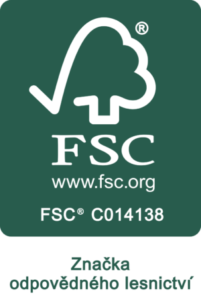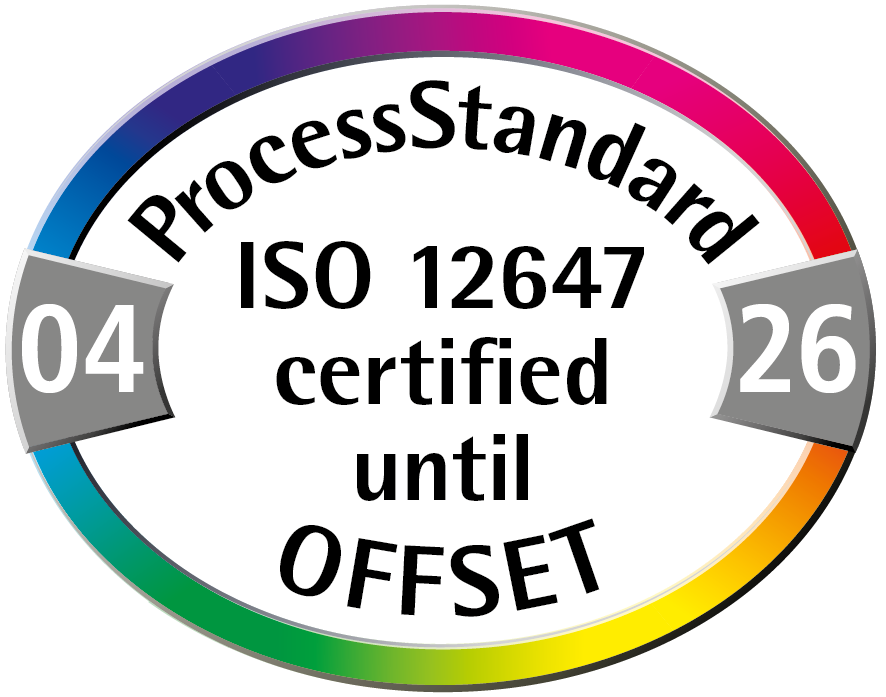Text: Maryla Adamčíková, Zdeněk Ližička | Photo: Lukáš Duspiva
Let’s read together the book of Zdeněk Ližička’s life, which he has been printing with FINIDR for more than 25 years. Moreover, Zdenek surprised me with his transformation, which he also talked about.
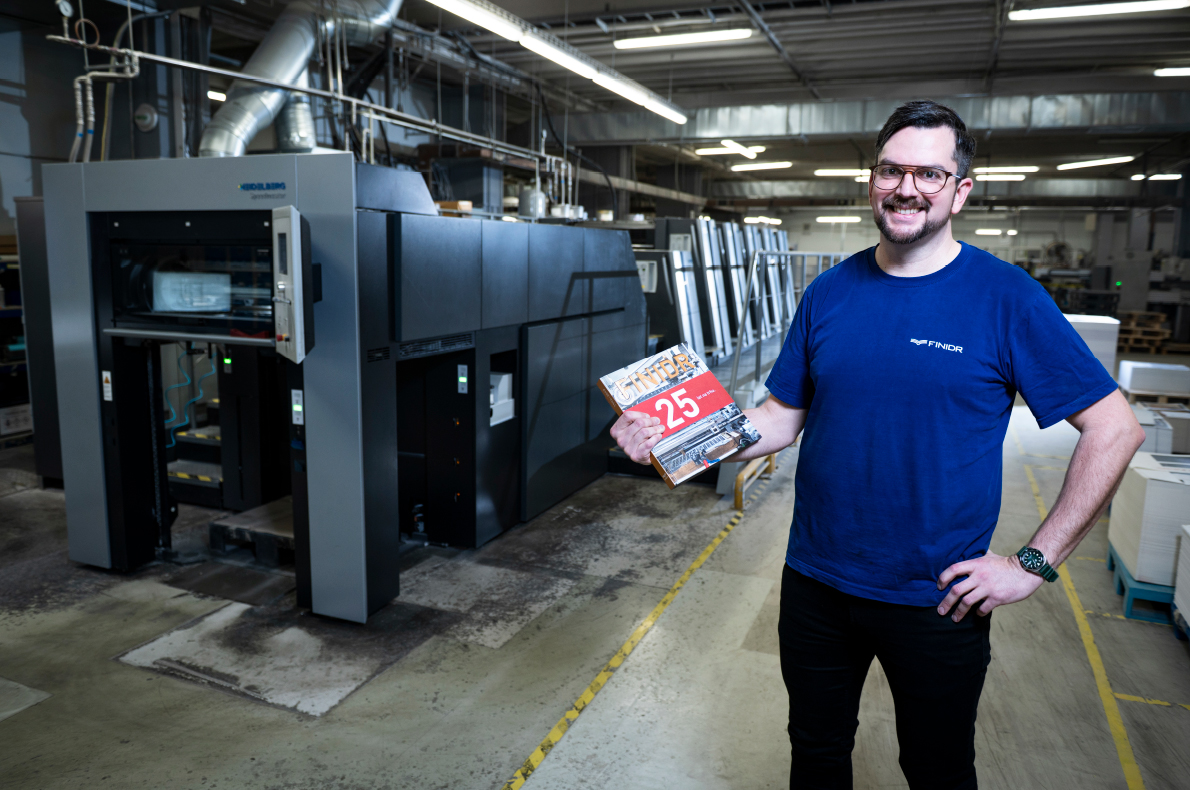
Zdenek, last year you celebrated 20 years as a printer at FINIDR, that’s quite a number of years!
I have been working here for 20 years on a main job, but I always say that I have been at FINIDR for 25 years, because I came here first for an internship from the printing school and then also for a part-time job. I completed a three-year apprenticeship as a printer and then a two-year extension in the printing field with a high school diploma at a vocational high school in Olomouc. I commuted to Olomouc at that time, because no school here in Český Těšín offered a printing course like Albrecht High School does now.
What made you choose to become a printer and thus study in Olomouc?
This is the greatest part of my destiny. My grandmother already worked in the Těšín printing house and, according to family legend, she used to load plates, so she worked in the so-called preparation, today you could say in the studio. My father Zdenek also worked at Těšínské printing house and in the 1990s he started working for FINIDR, then it was at the binding line. And to make matters worse, my uncle, Herbert Schiebl, is also connected with FINIDR. He worked here for a number of years, specifically on RAZAR foiling machine. In short, he’s been printing all his life. So, the family history was clear – you’ll be a printer. It wasn’t my heart’s desire, my childhood dreams were to become a footballer or a chef, but my family stood firmly on the ground, believed in the future of this field and directed me to the printing industry.
Have you gone off the beaten path?
FINIDR’s support for me and my family was great because of a difficult family situation when my father died. Because of this tragedy, the management at the time supported me and my family during my studies, and I also had a job secured for 3 years after graduation. In short, I trained for FINIDR. In addition, I was very well received by the staff at that time. I perceived a friendly, almost family-like atmosphere.
Weren’t you tempted to do something different or in the industry but still elsewhere?
I really like the town of Těšín. Olomouc has also won a place in my heart during my five years of study, but my whole family and my wife Lucie are from Český Těšín and I really enjoy working as a printer. It is simply interesting for me. It may not seem like it, but my job is always changing. Even if you are always printing books, you never know what the next book will be, what it will surprise you with. I love that plain paper becomes something so interesting and beautiful, which is what a book is. I really like books and I also like to read. It fulfills me to be doing something I enjoy. Not to mention that what I also love about printing is that while printers are workers, as an old professor at my school told us, they are actually artists too. Offset printing is based on lithography, which is an artistic discipline. I don’t want to make it sound exaggerated, but that’s my feeling. That’s how I feel about our industry and I’m proud of it.
What machine are you working on now? Can you tell the readers what your daily routine looks like?
Right now, I’m working on a Heidelberg Speedmaster XL 75-5+L (H7), a five-colour press machine where we print the so-called extras, i.e. covers, envelopes. In short, the most interesting thing about the book. The cover sells, so we have to ensure the highest quality, although with the incoming automation this is no longer as true as it once was. On the other hand, automation makes certain activities faster and allows us to print more jobs. For me, the H7 is the best machine I’ve worked on here. When the machine was new, I was very excited, and I still haven’t left the excitement of the five-color. It is physically demanding work though, as you get quite a lot of steps around the machine, hopefully I can do it in good health and full strength even at an older age. But I can’t imagine it now.

At the beginning of the interview I write about your visible transformation. At first glance, it is obvious that you have lost weight and it suits you very well. What was your motivation?
The transformation is gradual, I’ve been working on it since 2021. The biggest trigger was the provisional Drupa at FINIDR. I saw myself in the Těšín Minutes video afterwards and as I watched, I thought, this is bad already. Added to that was elevated cholesterol and general health issues, and that was one of the few triggers. I had always played sports, I played floorball for Český Těšín for 10 years, so I thought it was ok, but I gained weight and I was 130 kg. My wife and I started running on next day. It was nice that we were in it together from the beginning. We had a lot of help in the beginning from Rosťa Bajtek. He advised us how to run so that we could get some results and the motivation never left us. There was the first progress, but it wasn’t as big as we wanted, so we went on a box diet. We’ve been on it so far.
Zdeněk, this is certainly an inspiration for others. What is the overall result of your decision?
We still stick to boxed food every day. My wife still runs regularly. I don’t really enjoy it, but for three years I managed to run 4 times a week. Now I go for a run once. Then I really like to ride my bike, even in the winter. My record is 111 km a day, for example. In the season I ride 5 or 6 times a week, depending on my shifts. And weight loss? I lost a total of 28 kg. I feel much better and I’m having a great time cycling.
Was there or is there any food on the boxed diet that surprised you or you didn’t like, and do you even go to our canteen?
I don’t really have a favourite food. But with the boxed diet, I was surprised that celery, when prepared well, is very good. And I didn’t like it. I also have to admit that I like to enjoy every meal. Of course, we cook at home on the weekend, but one gets caught up in the box diet and the recipes are repeating on so we can prepare them at home. We don’t have boxes right now, so I used to go to the cafeteria for lunches, but as part of the diet I used to bring my lunch from home. And why are we taking a break? We’ve had the experience that in the winter, you still eat something, I guess your body needs it, but I eat much smaller portions anyway. In winter, even if I keep everything without snacking, I don’t lose weight. Let’s wait for spring, at least it doesn’t make me to get enough.
What are your hobbies, besides cycling?
My wife and I love traveling, especially to interesting places. We explore Italy the most. We are interested in history, but of course we also stop by the sea. The last time we visited, for example, Florence or Siena. Last year we were in Tuscany, it was a great vacation in terms of the landscape. Tuscany is not even very Italian, it is more like Greece. What I love most about Italy is how Italians know how to live, how they enjoy everything. But when it comes to food, their portions are quite big.
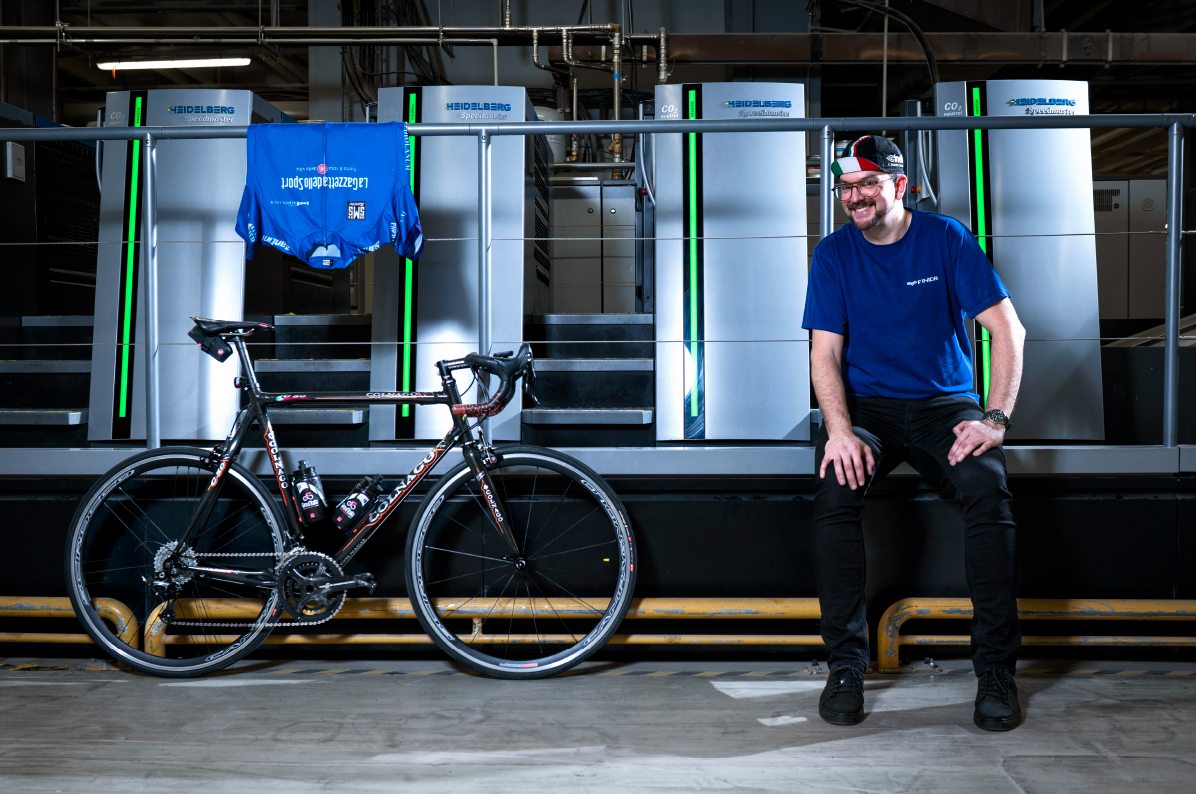
But my biggest passion is not only road cycling, but it is also cycling fandom. We go to Italy for the Giro d’Italia, for example with Renek Baran from FINIDR, with whom we cycle and the mentioned record in kilometres cycled is our common one.
As Renek says, we organize historical rides around the area. I don’t train on purpose to be faster. I’m more of a road cycling fan and I feel more like Pogačar, whereas racers talking only about watts. But these numbers leave me cold. We also try to attend cycling races in the region, such as the Tour de Pologne, which in the past included a ride through Těšín.
It’s all very interesting: the food, the bike and Italy. What are your plans for the summer…and this year Italy?
Yes, it starts with the Giro, then my wife and I have a holiday in Italy. Last year I saw show Cirque du Soleil here in the Czech Republic and we were so excited about it that we bought tickets to Trieste, Italy. But otherwise, we’re also pretty happy at the summer swimming pool in Řeka. Oh, and I hope to get a lot of miles on my bike.
What to say in conclusion. Thank you very much, Zdenek, for your openness in the interview and I wish you many happy kilometres – tanti chilometri felici in bici, buona fortuna a te!
Thank you. To my colleagues at FINIDR, I would like to wish them to find what I believe is the greatest wisdom of life, as told by T. A. Edison: “The secret of success in life is not to do what we like, but to find pleasure in what we do.”
I’d like to wish FINIDR many more nice jobs and in cycling jargon – may he keep pedaling at the same cadence as before.
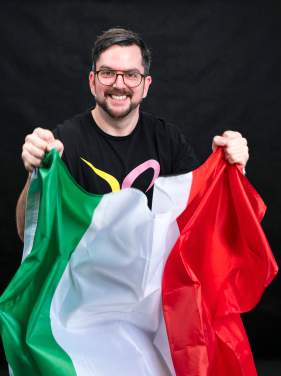
Zdeněk Ližička
Sign of zodiac: Horned Goat – Capricorn
What I appreciate the most about my colleagues?
Positive attitude and willingness
Who will I support most at Giro d´Italia this year?
Our Jan Hirtov, I believe he will show us great things
My hardest phase on bike was
track cycling training at the Brno velodrome
I can cook healthy
This I am leaving with my wife just to be sure
While I am cheering I am screaming
„Forza, Pogačar“ most of the time




